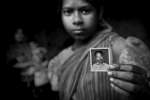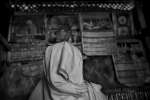How a Bangladesh court ruling changed the lives of more than 300,000 stateless people
News Stories, 23 February 2015
DHAKA, Bangladesh, February 23 (UNHCR) – It's a cool Sunday afternoon in the Geneva camp in Dhaka, Bangladesh. Small crowds have gathered on the settlement's narrow alleys, transfixed by an open-air screen showing a live World Cup cricket match between India and Pakistan. Some boys have painted the Pakistani flag on their faces and chests – the legacy of a past that continues to affect them today.
During the 1947 partition of the sub-continent, hundreds of thousands of Urdu speakers migrated from India to what was then East Pakistan. As some Urdu speakers had sided with Pakistan during Bangladesh's war of independence, many in Bangladesh faced violence and were forced to live in camps in urban centres; this was meant to prevent violence between majority and minority communities when the country became independent in 1971.
By 2006 there were an estimated 151,000 stateless Urdu speakers in 116 camps and settlements in Bangladesh, with another 100,000 living outside camps and also without citizenship. Since then, court rulings and a concerted effort by national and international parties helped bring down the number of stateless people and set a good example on how to reduce statelessness.
The Geneva camp alone hosts some 30,000 Urdu speakers. As the Sunday crowd focuses on the cricket, two young women wrap up their day at work. They may not know it, but Nahid Parveen and Shabnaj Akter, both 20, hold the key to their community's present and future.
They work in a legal aid centre launched by Khalid Hussain, the first lawyer among the Urdu speaking community living in camps in Bangladesh. He studied in the camp up to Grade Eight and then attended a state school, where the medium of instruction was Bengali. Subjected to frequent ridicule and prejudiced remarks, most of his friends dropped out and only four managed to complete their studies - no small feat.
Together with a friend, Hussain founded the Association of Young Generation of Urdu-Speaking Community in 1999 and started to advocate for Bangladeshi citizenship for this community. Two years later, Hussain and nine other Urdu speakers filed a writ petition to confirm the right of Urdu speakers to citizenship.
In 2003, the judgment was delivered – the Supreme Court granted citizenship to the petitioners and directed the government to register them as voters. For Hussain and his community, the verdict was a milestone. "This ruling changed my life," he said.
Following the court ruling UNHCR helped liaise between national campaigners, the international community and the government. In 2008, the Supreme Court stated that all members of the Urdu-speaking community were nationals of Bangladesh in accordance with its laws and directed the election commission to include them in electoral rolls and give them national identity cards. This declaration ended the statelessness of more than 300,000 Urdu-speaking men, women and children residing in the country.
For this achievement, Bangladesh features as one of seven case studies from Asia, Europe and Latin America in the first of a series of UNHCR Good Practices Papers released on Monday. The first one of these, "Resolving Existing Major Situations of Statelessness," corresponds to the first action point of the 10-point Global Action Plan, which is part of UNHCR's #IBelong campaign to end statelessness by 2024.
It demonstrates how it is possible to resolve the situation of hundreds of thousands through political will and action, technical advice and targeted advocacy by UNHCR as well as collaboration from a broad range of civil society actors.
In Bangladesh, Khalid Hussain founded the Council of Minorities to sensitize the Urdu-speaking camp dwellers about their rights. The organization's six legal aid centres provide free services. "We facilitate the acquisition and use of birth certificates, passports, trade licences and ID cards," said Hussain.
Nahid Parveen is proud of her work there because it earns her respect in the community: "When I leave home . . . people greet me on the streets." Shabnaj Akter works part-time as a paralegal so that she can continue her studies. Her Bengali friends are friendly, she said. They are comfortable visiting her congested home in the camp and she has never experienced discrimination as an Urdu speaker.
While doors have opened for the community, there are still daily obstacles to be overcome. Many Urdu speakers continue to live in extreme poverty, sometimes unable to access basic services, either because of the unavailability of such services in their area or because they cannot meet the legal or administrative requirements.
For example, the camp residents lack a valid address, which is required to acquire a passport. The challenge now is to facilitate an unhindered access to their civil rights so they can have equal opportunities like any other Bangladeshi citizen.
By Onchita Shadman in Dhaka, Bangladesh and Roland Schönbauer in Geneva
Good Practices Paper – Action 1: Resolving Existing Major Situations of Statelessness
























































